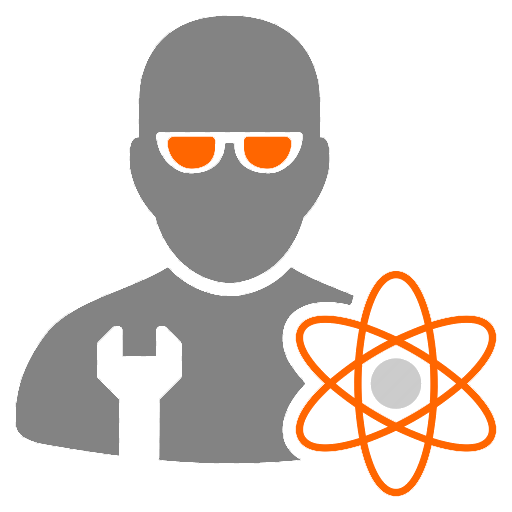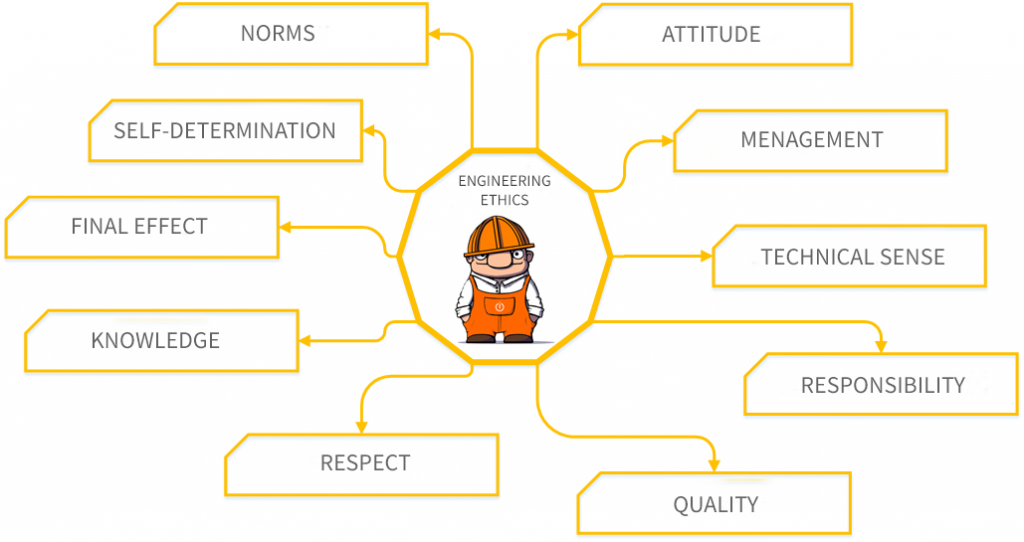MSc Janusz E. – electrician walking around the plant. He replaces blown fuses with a nail, and he makes jumpers from uninsulated piece of wire. Our electrician graduated from the university of technology not so long ago. Although, he really blew off his whole education, he obtained a master’s degree… Master of Science. Immediately after graduation, he started working in the profession and acquired a lot of experience with his brother-in-law at construction sites. Right after that, he got a nice job in the factory.
Janusz has the title of Master of Science… but is he really an engineer?
So, what an engineer should be like? How a specialist should work? Is the experience enough? On the basis of other articles, discussion on forums and my own observations and experiences, I will try to answer these questions.
Let’s start with the professional ethics and then let’s go further to the engineer’s ethic. At the beginning, let’s define the term professional ethic:
- Ethics – a system of accepted beliefs that control behavior, especially such a system based on morals.
- Profession – any type of work that needs special training or a particular skill, often one that is respected because it involves a high level of education.
So, the professional ethics is a set of moral norms defining a given group that performs the same of similar professions. Professional ethics tries to describe the pattern of behavior of the profession in moral and ethical terms, which fulfill the certain norms.
Let’s move forward to the term Engineer. What’s the definition? Let’s ask Wikipedia:
“Engineer is competent by virtue of his/her fundamental education and training to apply the scientific method and outlook to the analysis and solution of engineering problems. He/she is able to assume personal responsibility for the development and application of engineering science and knowledge, notably in research, design, construction, manufacturing, superintending, managing and in the education of the engineer. His/her work is predominantly intellectual and varied and not of a routine mental or physical character. It requires the exercise of original thought and judgement and the ability to supervise the technical and administrative work of others.” (Wikipedia)
It’s so superficially, right? While browsing the Internet and downloading more books, I came across an engineer’s description, and I like this more:
“The engineer, based on his thorough education and professional practice, is able to apply scientific point of view and scientific methods to analyze and solve technical problems. He is able to take the responsibility for the development and application of engineering science and engineering knowledge, in particular in research, production, supervising, management and training of engineers.
His work is mostly mental and unconventional, it is not mental work, which skills are acquired through routine or physical work. It requires you to be guided by your own thinking and your own judgment and the ability to supervise the technical and administrative work of others.
The engineer’s education and professional practice should give him a broad view of all technical knowledge, and at the same time a thorough knowledge of specific issues in his specialty. After gaining appropriate experience, the engineer should be able to give authorized technical indications and take over responsibility for managing important works in his branches” (Jan Hoser, Zawód i praca inżyniera, translation: Engineer’s profession and work)
Let’s say that we defined the term Engineer, but how does he work and on what basis he makes decisions, how does he starts and ends his work? To obtain answers these questions, we will need the term from the beginning of this article.
ENGINEERING ETHICS

We can define this term as a set of norms and principles, which make it possible for the engineers to obtain internal self-determination of technical operation and professional job. In a certain sense the engineering ethics has a character of conscience in a technical dimension. This conscience leads the engineer to realization of task, from the moment of occurring the problem to resolving it.
Let’s pick everything together and let’s try to generate the summary:

NORMS: appointing of moral boundaries and rules of conduct. In some groups of engineers, standards are defined by the code. In fact, standards are set by the environment, which consists of a professional engineering team. With the experience, the awareness of standards also increases. It depends on us, whether or not, we respect the rules. Standards can have a global dimension that means the attitude of an engineer to the society or the environment. They also can be specified to a specific issue of a given profession.
ATTITUDE: the engineer’s morale should be high as a result of obtained knowledge and experience. Usually, the engineers is a treated as a role model. Engineer’s profession is some king of art. That’s why attention to professional authority should be a big part of engineer’s work and all public speeches.
MENAGAMENT: when engineer got some problem to solve, before starting he plans its solution. Good work management allows for achieving the goal and avoiding chaos and unnecessary mistakes. When starting the work, engineer knows which tools he has to use and what effect he wants to achieve.
TECHNICAL SENSE: the technical sense can be defined as the intuition of an engineer, which is shaped in the process of his education and in later professional life. Strict subjects such as Mathematics, Physics or Electro-technics shape the technical sense of every idea of solving tasks during these subjects. Most of the issues and theories may not be useful in the life of engineer but they will shape the engineer’s mind in the technical dimension, which will allow him to manage his work more efficiently. So, if you’re still a student, get back to study!
RESPONSIBILITY: professionalism in not only having professional competences and “technical skills”, but also the consideration of “ethical element”, especially guiding by the sense of responsibility and having skills of predicting the effects of the action.
QUALITY: the quality of engineer’s work, should be an example and setting the standard, from the beginning to achieving final result.
RESPECT: and humility. Engineer should cooperate with the surrounding, with the respect to people and environment. Despite of his higher qualifications he should not exalt himself and treat anyone with contempt. The correct criticism calm engineer will accept with humility, and the incorrect one – will left unsaid.
KNOWLEDGE: without the fundamental knowledge of engineer’s profession, he will not be able to respect the borders of professional ethics. The bigger knowledge and experience, the bigger moral conscience.
SELF-DETERMINATION: one of the most important engineer’s feature. Engineer does not give up during task realization. He will analyze all of the problem aspects to achieve intended effect.
FINAL EFFECT: the final result is a summary of the entire work of the engineer. The engineer’s assessment is based on the final result of his work. It is often the case that the engineer’s work can go unnoticed.
The engineer has many roles. The engineer is a teacher, inventor, expert, manager, technologist and many others. From the state of observance of norms and codes of ethics that are currently represented by professionals in their profession, depends on what norms of behavior will prevail in future generations.
It is rare that an engineer treats his work only as a profession. Often this is related to passion and calling. If we do not go to work out of duty but there is in it all a note of passion, working over 8 hours does not have to be exhausting.
Being an engineer requires reliable and hard work, above all, working on yourself. Asking myself if I am an engineer, I answer: Whether you are an engineer depends on getting the recognition of the evaluators.
Author: Marcin F.
